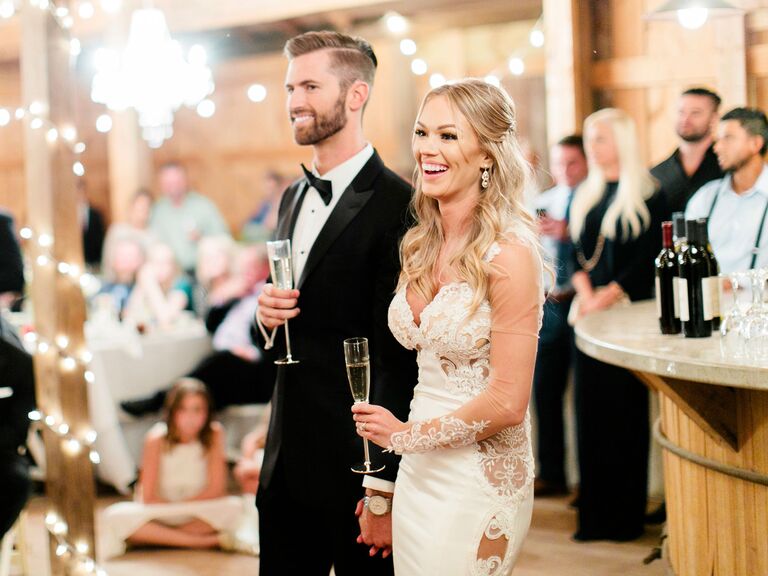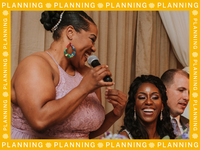How to Nail Your Wedding Toast If You Hate Public Speaking
If you break into a cold sweat at the thought of delivering a wedding toast, you're in the right place. Nerves are perfectly natural—unfortunately they hit some people harder than others. But with a bit of structure and a lot of practice, you can finally beat your anxiety and pull off an amazing wedding toast. We asked Jennifer Hester, a public speaking tutor at Varsity Tutors, for her top toasting pointers anyone can follow—whether you're the bride's grandfather, a nervous maid of honor or the groom himself.
Keep It Simple
Hester's most valuable speech advice is as easy to swallow as the glass of champagne you'll be holding. "The cardinal rule to a good speech is: Tell them what you're going to tell them, tell them and then tell them what you've told them," she says. Why? Anyone with serious toasting nerves needs some structure. That way, when your knees start to quake and your mind gets a little fuzzy, you can zone back in by following a familiar, straightforward formula. "It seems redundant, but giving an outline of what you're going to cover in your speech and reminding the audience where you are as you go along will both lend you credibility and let them know you're a pro," Hester says.
Hester says it could go a little something like this: "Today, in honor of Anna's wedding, I wanted to share a story from when we were little and bless this new couple. First, the story…"
Avoid Touchy Topics
A sure way to feel uncomfortable in front of a crowd is for you to make the crowd uncomfortable with your toast. In other words, avoid inappropriate anecdotes, crude language, private references and inside jokes (trust us, they won't land like you want them to—which will make the whole room feel super awkward.) In short? "Know your audience and what tone you should take," Hester says.
Practice Out Loud—Often
Yes, you'll feel kind of goofy talking to yourself in the mirror, but you'll get over it. "I constantly tell my students to practice out loud as much as possible. The more you hear yourself saying your speech, the more you'll be prepared to deliver it," Hester says. But she's not saying to run through it once or twice the day before it's due. Rehearse your toast many times over several weeks (even months, if you need to) at the pace and volume you'll use to deliver it. Trial runs are your chance to iron out awkward phrases, plan where you'll place emphasis and pause for potential audience reactions. Plus, the more times you read through it, the more familiar it'll be.
Record Yourself
Find yourself saying "like" and "uh" a lot? Go the extra mile and record yourself practicing. This is hands down the best way to catch any verbal fillers in your speech (think: "like," "um," "so then" or even throat clearing). Once you notice how often you do them, try slowing down your pace and putting a little more thought into the delivery. Hester encourages you not to beat yourself up about these, however. It's perfectly natural and common to lean on verbal crutches here and there, and the first step to breaking the habit is being more aware of them.



Choose a Trusted Confidante
Once you've run through your speech on your own, ask for feedback from someone whose opinion you trust. If you feel like a friend or family member won't give you their honest or helpful thoughts, don't be afraid to look to a pro (like a Varsity Tutor tutor—wink, wink). They're experts who can give you both the useful feedback and positive encouragement you need to crush it.
Bring Notes If You Need Them
You're not a failure if you have to bring a few notes to the mic—so many people do! Just make sure to use those notes when you practice so you don't have to rely on them completely and forgo eye contact when the big moment comes (lack of eye contact is a big toasting no-no by the way.) "There's nothing wrong with glancing down, but you shouldn't write down every word of your speech," Hester says, "Try to write the highlights and important details to help jog your memory when you look at them."
Distract Yourself
Don't let the thought of your toast loom over your experience at the wedding. Before your speech, you should be enjoying a cocktail, taking photos and hugging the newlyweds—not locking yourself in the bathroom to obsess over it some more. If you've practiced enough, all your hard work should take over once you take the mic. And by "distract yourself" we don't mean down five signature cocktails—sure, have a drink to loosen up, but save the serious partying for post-toast.
Take It Slow
"Many people get nervous when they start speaking in front of a crowd and speed up their delivery," Hester says. Sound familiar? Force yourself to take several deep breaths and slow down even more than you think you need to so everyone can understand you. What's the point in saying your toast if you mumble your way through it? Make it worth all that hard work by delivering a clear, smooth toast.
Never Lock Your Knees
This might sound too simple to be helpful, but it's the best way to avoid passing out—seriously. We won't get into all the science here, but basically "locking your knees" can supposedly restrict blood flow to your head and upper body, which could lead to fainting. And apparently it can be worse when you're emotionally stressed (read: nervous about public speaking), too hot or dehydrated. "Feel free to move around if the space permits and do whatever feels natural with your hands," Hester says. And avoiding a stiff posture isn't just for you: "Don't stand stiff as a board—the audience will feel your discomfort."
Go Easy on Yourself
Hester is adamant about this one. "Don't tell yourself any 'shoulds,'" she says. "There isn't one perfect way to write a speech or toast. As long as you're organized, authentic and practiced, you'll be great." The most important thing is to remember why you're making this speech in the first place: You're celebrating people you adore and who adore you—it's all good.
Want more speech advice? Here are nine common toast mistakes not to make.





















